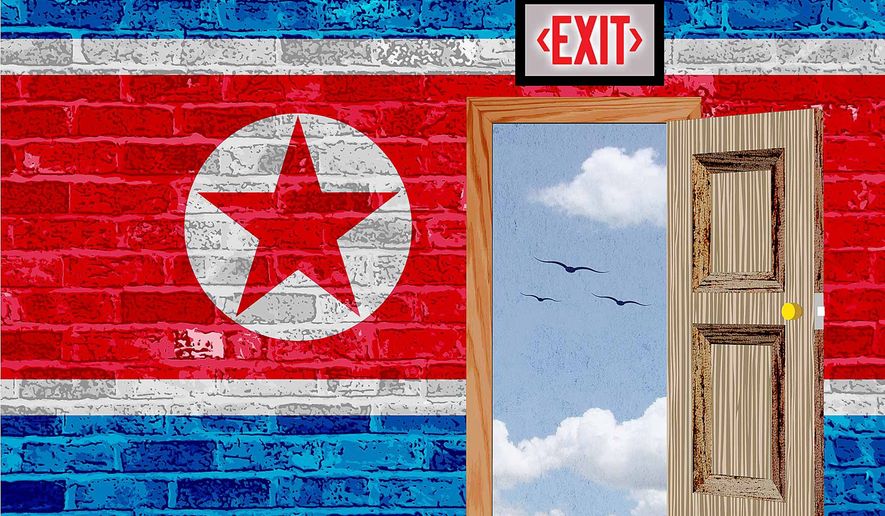OPINION:
President Trump needs a “Plan B” to force Kim Jong-un to give up his nuclear program. Much like negotiating with the Soviet Union during the Cold War, any direct talks with North Korea are not likely to succeed if American negotiators continue to ignore human rights and focus exclusively on arms control.
Until the 1980s, U.S.-Soviet summit conferences resulted only in briefly reduced tensions or broken promises. The Reagan-Gorbachev summits were different because they stressed the importance, indeed the primacy, of human rights, especially including the right of Soviet Jews to emigrate under the Jackson-Vanik Amendment.
The Jackson-Vanik Amendment, named for its sponsors, Sen. Henry M. (“Scoop”) Jackson, Washington Democrat, and Rep. Charles Vanik, Ohio Democrat, specified that the Soviets would be granted Most Favored Nation (MFN) status only if they allowed their people the right to leave. Richard Perle, then a staffer for Jackson, noted, “Scoop believed that immigration was in some ways the most powerful of all the human rights because If you can imprison people you can do anything, but if people have the right to leave, you’d have to create a decent society, so that was the seminal human right for Scoop.”
Before any of Ronald Reagan’s meetings with Mikhail Gorbachev, he would present a list of Soviet Jews who were either harassed or denied an exit visa. Secretary of State George Shultz repeatedly informed the Soviets that if they wanted to talk to the United States about trade or arms control, Soviet Jews would have to be granted the right to emigrate. The Trump administration should follow President Reagan’s approach.
The North Korean regime has a long history of misleading and lying to American diplomats. Without a modern Jackson-Vanik Amendment, Kim Jong-un will likely renege on any promises for eventual disarmament as soon as the economic sanctions are relaxed. Under current law, Mr. Trump cannot promise economic development for North Korea while ignoring human rights.
We urgently need a modern equivalent of Jackson-Vanik, specifically designed for the North Korean regime. If Mr. Trump has any chance of having Kim Jong-un give up his nuclear weapons, he must speak for those North Koreans who cannot speak for themselves.
Greg Scarlatoiu, executive director of the Committee for Human Rights in North Korea (hrnk.org), believes the Trump administration could make it easier for refugees to flee North Korea.
Mr. Scarlatoiu said that the U.S. could demand that China honor its commitments as a signatory of the 1951 Refugee Convention. According to Article 33, “No Contracting State shall expel or return (“refouler”) a refugee in any manner whatsoever to the frontiers of territories where his life or freedom would be threatened on account of his race, religion, nationality, membership of a particular social group or political opinion.”
While many North Koreans are forced to work in slave labor camps, thousands of North Korean women have escaped to China only to be trafficked into prostitution or forced marriages with Chinese men. China, North Korea and South Korea have rightfully condemned Japan for forcing Korean and Chinese women to become “comfort women” for Japanese soldiers during World War II.
We need a type of #MeToo campaign among the surviving Chinese and Korean comfort women. They need to shame the Chinese government to welcome the North Korean refugees out of the shadows while the South Korean government agrees to admit them into their country. This would ensure a safe passage for refugees to South Korea. This could also inspire other North Koreans to leave.
Jackson-Vanik was a threat to the Soviet regime for the same reason East Germany could not survive after the Berlin Wall fell. The moment people started to leave these two countries, everything began to change. The possibility of North Koreans fleeing to South Korea through China, could force Kim Jong-un to surrender his nuclear program.
Along with the former Soviet Union, South Korea’s dictatorship was brought down because the United States effectively used its influence to advance human rights.
In 1980, South Korea was a military dictatorship run by President Chun Doo Hwan. When Mr. Reagan won the 1980 election, Mr. Chun thought he would finally be able to execute prominent dissident Kim Dae Jung. Just before Mr. Reagan took office, Mr. Chun sent envoys to Mr. Reagan’s National Security Adviser Richard Allen. The South Koreans were told that Mr. Reagan’s policy would be that executing Mr. Kim would do irreparable damage to the alliance.
Mr. Chun wisely decided not to kill Mr. Kim. This emboldened the dissident movement and eventually led to democratization of South Korea by 1988. In 1993, Kim Dae Jung was elected president of South Korea.
The same thing can happen to North Korea.
• Richard V. Allen, former Reagan National Security Adviser, is a senior fellow at the Hoover Institution, Stanford University. Lee Edwards is a distinguished fellow in conservative thought at The Heritage Foundation. Robert Zapesochny’s parents and older brother came to this country because of the Jackson-Vanik amendment. He is an independent writer in Rochester, N.Y.




Please read our comment policy before commenting.